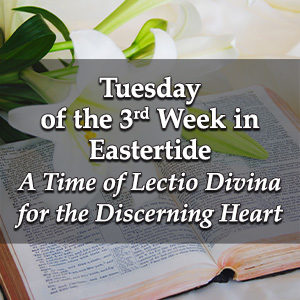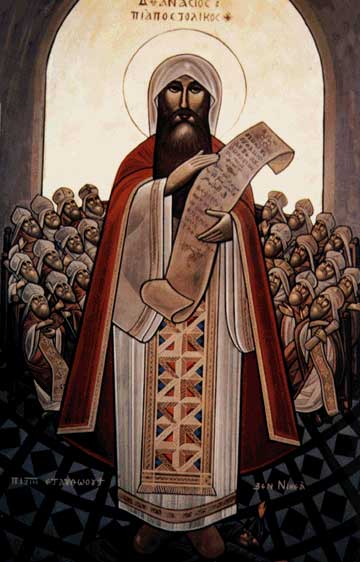Podcast: Play in new window | Download (Duration: 11:02 — 7.8MB) | Embed
Subscribe: Apple Podcasts | Spotify | Amazon Music | Android | Pandora | iHeartRadio | JioSaavn | Podchaser | Gaana | Podcast Index | Email | TuneIn | Deezer | Anghami | RSS | More
 Tuesday of the Third Week of Eastertide – A Time of Lectio Divina for the Discerning Heart Podcast
Tuesday of the Third Week of Eastertide – A Time of Lectio Divina for the Discerning Heart Podcast
As you begin, take a deep breath and exhale slowly. For at least the next few moments, surrender all the cares and concerns of this day to the Lord.
Say slowly from your heart “Jesus, I Trust In You…You Take Over”
Become aware that He is with you, looking upon you with love, wanting to be heard deep within in your heart…
From the Holy Gospel According to St. John 14:6-14
Jesus said to Thomas:
‘I am the Way, the Truth and the Life.
No one can come to the Father except through me.
If you know me, you know my Father too.
From this moment you know him and have seen him.’
Philip said, ‘Lord, let us see the Father and then we shall be satisfied.’
‘Have I been with you all this time, Philip,’ said Jesus to him ‘and you still do not know me?
‘To have seen me is to have seen the Father,
so how can you say, “Let us see the Father”?
Do you not believe
that I am in the Father and the Father is in me?
The words I say to you I do not speak as from myself:
it is the Father, living in me, who is doing this work.
You must believe me when I say
that I am in the Father and the Father is in me;
believe it on the evidence of this work, if for no other reason.
I tell you most solemnly,
whoever believes in me
will perform the same works as I do myself,
he will perform even greater works,
because I am going to the Father.
Whatever you ask for in my name I will do,
so that the Father may be glorified in the Son.
If you ask for anything in my name,
I will do it.’
What word made this passage come alive for you?
What did you sense the Lord saying to you?
Once more give the Lord an opportunity to speak to you:
Jesus said to Thomas:
‘I am the Way, the Truth and the Life.
No one can come to the Father except through me.
If you know me, you know my Father too.
From this moment you know him and have seen him.’
Philip said, ‘Lord, let us see the Father and then we shall be satisfied.’
‘Have I been with you all this time, Philip,’ said Jesus to him ‘and you still do not know me?
‘To have seen me is to have seen the Father,
so how can you say, “Let us see the Father”?
Do you not believe
that I am in the Father and the Father is in me?
The words I say to you I do not speak as from myself:
it is the Father, living in me, who is doing this work.
You must believe me when I say
that I am in the Father and the Father is in me;
believe it on the evidence of this work, if for no other reason.
I tell you most solemnly,
whoever believes in me
will perform the same works as I do myself,
he will perform even greater works,
because I am going to the Father.
Whatever you ask for in my name I will do,
so that the Father may be glorified in the Son.
If you ask for anything in my name,
I will do it.’
What did your heart feel as you listened?
What did you sense the Lord saying to you?
Once more, through Him, with Him and in Him listen to the Word:
Jesus said to Thomas:
‘I am the Way, the Truth and the Life.
No one can come to the Father except through me.
If you know me, you know my Father too.
From this moment you know him and have seen him.’
Philip said, ‘Lord, let us see the Father and then we shall be satisfied.’
‘Have I been with you all this time, Philip,’ said Jesus to him ‘and you still do not know me?
‘To have seen me is to have seen the Father,
so how can you say, “Let us see the Father”?
Do you not believe
that I am in the Father and the Father is in me?
The words I say to you I do not speak as from myself:
it is the Father, living in me, who is doing this work.
You must believe me when I say
that I am in the Father and the Father is in me;
believe it on the evidence of this work, if for no other reason.
I tell you most solemnly,
whoever believes in me
will perform the same works as I do myself,
he will perform even greater works,
because I am going to the Father.
Whatever you ask for in my name I will do,
so that the Father may be glorified in the Son.
If you ask for anything in my name,
I will do it.’
What touched your heart in this time of prayer?
What did your heart feel as you prayed?
What do you hope to carry with you from this time with the Lord?
Our Father, who art in heaven,
hallowed be thy name.
Thy kingdom come.
Thy will be done on earth, as it is in heaven.
Give us this day our daily bread,
and forgive us our trespasses,
as we forgive those who trespass against us,
and lead us not into temptation,
but deliver us from evil.
Amen


 In all likelihood Athanasius was born in Alexandria, Egypt, in about the year 300 A.D. He received a good education before becoming a deacon and secretary to the Bishop of Alexandria, the great Egyptian metropolis. As a close collaborator of his Bishop, the young cleric took part with him in the Council of Nicaea, the first Ecumenical Council, convoked by the Emperor Constantine in May 325 A.D. to ensure Church unity. The Nicene Fathers were thus able to address various issues and primarily the serious problem that had arisen a few years earlier from the preaching of the Alexandrian priest, Arius.
In all likelihood Athanasius was born in Alexandria, Egypt, in about the year 300 A.D. He received a good education before becoming a deacon and secretary to the Bishop of Alexandria, the great Egyptian metropolis. As a close collaborator of his Bishop, the young cleric took part with him in the Council of Nicaea, the first Ecumenical Council, convoked by the Emperor Constantine in May 325 A.D. to ensure Church unity. The Nicene Fathers were thus able to address various issues and primarily the serious problem that had arisen a few years earlier from the preaching of the Alexandrian priest, Arius.
